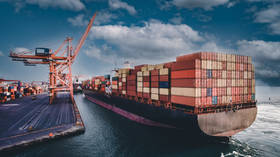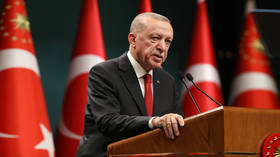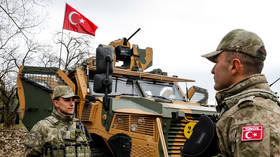There are advantages and disadvantages to Türkiye doubtlessly becoming a member of the bloc of rising economies
In the beginning of this month, information of Türkiye’s need to hitch BRICS drew world media consideration. The announcement was made by Turkish International Minister Hakan Fidan throughout his go to to China. “After all, we want to turn out to be a member of BRICS. Let’s see what we will obtain this yr,” stated the minister, as quoted by the South China Morning Submit.
This problem was additionally mentioned on the BRICS international ministers’ assembly in Nizhny Novgorod, attended by Türkiye’s chief diplomat, Hakan Fidan. Türkiye’s need to hitch will not be fully new – throughout the BRICS summit of 2018, the place Turkish chief Recep Tayyip Erdoğan was a participant, Russian President Vladimir Putin stated Ankara may take part 2022. Nevertheless, subsequent occasions on the world stage apparently delayed that ambition, and Ankara is barely now displaying renewed curiosity.
What’s BRICS?
BRICS is a global affiliation initially comprising 5 main growing economies: Brazil, Russia, India, China, and South Africa. Established to boost cooperation and strengthen world positions, its title comes from the preliminary letters of member states’ names.
The idea started in 2001 when Goldman Sachs analyst Jim O’Neill coined “BRIC” for the fastest-growing main economies on the time: Brazil, Russia, India, and China. The primary formal assembly occurred in 2006 on the UN Basic Meeting. The primary BRIC summit was held in Yekaterinburg in 2009. South Africa joined in 2011, making it BRICS. As of January 1, 2024, Egypt, Ethiopia, Iran, Saudi Arabia, and the UAE have additionally joined.
BRICS goals to advertise financial progress, strengthen commerce and funding, develop infrastructure, and preserve monetary stability by way of mechanisms just like the New Growth Financial institution (NDB) and Contingent Reserve Association (CRA). It seeks better roles in worldwide establishments such because the IMF and World Financial institution. BRICS additionally focuses on scientific and technical cooperation in power, medication, and agriculture.
The affiliation strengthens financial ties, contributing to mutual improvement and commerce. By offering various funding sources, it reduces dependence on Western monetary establishments. BRICS international locations work collectively to defend their pursuits and promote a extra equitable world order. Additionally they tackle world challenges like local weather change and pandemics.
BRICS is exclusive as a result of its various membership spanning totally different continents and cultures. With out inflexible authorized frameworks, it permits versatile motion targeted on sensible cooperation and particular initiatives to enhance residents’ lives. This attracts extra non-Western international locations to hitch the affiliation.
BRICS vs G7
With the confrontation between the international locations of the worldwide majority and the West rising, BRICS is taken into account to be rising as a substitute for the G7. That is decided by a number of key causes associated to financial, political, and social elements. The G7, comprising main economically developed international locations – the US, Canada, the UK, France, Germany, Italy, and Japan – has historically dominated the worldwide area, shaping the worldwide financial and political agenda. Nevertheless, the emergence and improvement of BRICS have modified this steadiness, providing an alternate view on world governance and cooperation.
BRICS unites the most important growing economies on the planet, which collectively account for a big share of worldwide GDP and inhabitants. Collectively, BRICS international locations possess huge sources and potential for financial progress, making them essential gamers on the worldwide stage.
To offer a clearer understanding, let’s evaluate some indicators. With its 5 new members, BRICS now accounts for nearly 34% of the world’s land space, whereas the G7 accounts for 16%. BRICS international locations are residence to 45.2% of the world’s inhabitants, in comparison with simply 9.7% within the G7. The mixed GDP based mostly on buying energy parity in BRICS international locations is 36.7% of the worldwide whole as of 2024, in comparison with 29.6% for the G7. Knowledge on oil reserves present that BRICS international locations now maintain 45.8% of worldwide volumes, whereas the G7 holds solely 3.7%.
Thus, in lots of respects, BRICS surpasses the G7. The financial energy of BRICS permits these international locations to suggest various fashions of improvement and financial cooperation, differing from the Western approaches represented by the G7.
Resulting from worldwide contradictions and the damaging hegemony of Western international locations led by Washington, questions on the necessity to rework the world order are actively arising. BRICS advocates for a multipolar world, the place the steadiness of energy is extra evenly distributed amongst numerous areas and international locations. Whereas the G7 represents the pursuits of economically developed Western powers, BRICS focuses on the problems and pursuits of growing nations, which are sometimes marginalized in world politics. This makes BRICS an essential platform for international locations searching for better autonomy and independence from Western affect.
Furthermore, the creation of the New Growth Financial institution (NDB) and the Contingent Reserve Association (CRA) demonstrates the BRICS international locations’ need to ascertain various monetary establishments able to competing with conventional Western establishments, notably the IMF and the World Financial institution. These new mechanisms permit BRICS international locations and different growing nations to acquire financing on extra equitable phrases and with fewer political situations.
BRICS actively develops cooperation in fields corresponding to science and expertise, schooling, healthcare, and the setting. These initiatives intention to enhance the standard of life for residents of member international locations and tackle world challenges corresponding to local weather change and poverty. In contrast to the G7, which focuses on points related to developed international locations, BRICS locations specific significance on the issues confronted by growing nations.
BRICS represents a broader spectrum of cultures and areas than the G7, making it a extra inclusive and consultant group on the worldwide stage. This variety permits BRICS international locations to think about totally different views and desires, selling a fairer and extra balanced method to fixing world points.
This explains the curiosity of many international locations in changing into a part of the affiliation. Up to now, virtually 30 international locations have expressed a need to turn out to be full members of the affiliation or to realize accomplice standing. These embrace Azerbaijan, Algeria, Bangladesh, Bahrain, Belarus, Bolivia, Venezuela, Vietnam, Honduras, Zimbabwe, Indonesia, Kazakhstan, Cuba, Kuwait, Morocco, Nigeria, Nicaragua, Pakistan, Senegal, Syria, Thailand, Türkiye, Uganda, Chad, Sri Lanka, Equatorial Guinea, Eritrea, and South Sudan. Nevertheless, just some international locations from this record have formally utilized for membership: Algeria, Bangladesh, Belarus, Bolivia, Venezuela, Zimbabwe, Pakistan, and Thailand.
Thus, BRICS performs a big position in trendy world politics and economics, contributing to the event of multilateral cooperation and strengthening the positions of growing international locations on the worldwide stage.
Why Does Türkiye Need to Be a part of BRICS?
Türkiye exhibits vital curiosity in becoming a member of BRICS, seeing it as an essential step towards enhancing its worldwide affect and financial potential. This aspiration is pushed by a number of key elements associated to financial, political, and geostrategic elements.
Possessing one of many largest economies within the area, Türkiye goals to diversify its financial ties and strengthen cooperation with quickly growing international locations. Becoming a member of BRICS would give Ankara entry to an enormous market and alternatives to extend commerce and funding with the main economies of the growing world. That is particularly essential within the context of worldwide financial challenges and uncertainties, the place diversifying companions turns into a key issue for sustainable progress.
Türkiye has repeatedly confronted monetary difficulties and restrictions imposed by Western monetary establishments such because the Worldwide Financial Fund (IMF) and the World Financial institution. Becoming a member of BRICS would supply Türkiye with entry to the New Growth Financial institution and the Contingent Reserve Association, permitting it to safe funding on extra favorable phrases and with fewer political commitments. That is notably related for Türkiye, which seeks to keep up its financial independence and reduce exterior strain.
Türkiye actively helps the thought of a multipolar world, the place the steadiness of energy is extra evenly distributed amongst numerous areas and international locations. BRICS, advocating for multipolarity and honest world governance, represents a beautiful platform for Türkiye, which strives to boost its political independence from Western international locations and blocs such because the European Union and NATO.
On this context, it’s also value noting that Ankara views its need to hitch BRICS as a gesture in direction of the EU, a bloc it as soon as sought to hitch. That is confirmed by the phrases of Turkish International Minister Hakan Fidan. Throughout his go to to China, he famous that some European international locations oppose Türkiye’s accession to the EU, and thus Turkish authorities see BRICS in its place platform for integration. “We can not ignore the truth that BRICS, as an essential cooperation platform, gives another international locations a great various. … We see potential in BRICS,” he defined.
Türkiye’s geographic location makes it an essential hyperlink between Europe, Asia, and the Center East. Becoming a member of BRICS would strengthen Türkiye’s geopolitical place and allow it to successfully use its strategic location to advance its pursuits and strengthen ties with different member international locations. This could additionally contribute to enhancing Türkiye’s position in regional and world safety.
Membership in BRICS would considerably strengthen Türkiye’s worldwide affect and status. Türkiye would have the ability to take part within the improvement of worldwide financial and political methods, providing its concepts and options to deal with world issues. This could bolster Türkiye’s positions on the world stage and facilitate its extra lively participation in worldwide organizations and boards.
Türkiye seeks to hitch BRICS for a number of causes, together with financial improvement, entry to various monetary establishments, political independence, geostrategic pursuits, and the enhancement of worldwide affect. Becoming a member of BRICS would open new alternatives for Türkiye, strengthen its positions on the worldwide stage, and guarantee extra balanced and equitable participation in world affairs. Membership in BRICS would allow Türkiye to play a extra lively position in worldwide affairs and contribute to the creation of a extra balanced world system.
Obstacles to Türkiye’s Entry into BRICS
Though Türkiye’s entry into BRICS may carry vital advantages to Ankara, there are critical limitations that complicate this course of. These limitations embrace home political realities, financial challenges, and exterior strain from the West.
The home political scenario in Türkiye creates vital obstacles to becoming a member of BRICS. The ruling Justice and Growth Celebration (AKP), based by President Recep Tayyip Erdoğan, for the primary time in 22 years misplaced to the opposition in municipal elections held on March 31 this yr. The Republican Individuals’s Celebration (CHP), which historically helps pro-Western positions, gained management over 35 cities, whereas Erdoğan’s get together succeeded in solely 24 cities.
The CHP’s victory within the municipal elections signifies a shift in Ankara’s political route towards the West. Even inside the AKP, there are proponents of nearer ties with the West, complicating the choice to hitch BRICS. The deputy chairman of the Turkish get together VATAN (“Homeland”), Hakan Topkurulu, famous that Türkiye ought to be part of BRICS but in addition acknowledged the presence of a robust pro-Western group in Türkiye, related with NATO membership since 1952. These teams are a part of all political events and exert vital affect on the federal government, creating an inside battle between Atlanticist and Eurasian-leaning forces.
Türkiye has shut army and financial ties with Western international locations, making the query of becoming a member of BRICS much more advanced. Türkiye’s determination to turn out to be a BRICS member may provoke sturdy strain from Washington and its Western allies, who see BRICS as a risk to their dominance on the worldwide stage. This might manifest as sanctions, financial restrictions, and political strain, negatively affecting the Turkish financial system and its worldwide relations.
The financial scenario in Türkiye additionally presents a critical barrier to becoming a member of BRICS. The nation’s financial system is in a dire state, and excessive inflation forces financial authorities to hunt investments. At the moment, Türkiye depends extra on the West on this regard, as BRICS international locations are primarily growing economies themselves and can’t supply such vital investments.
Though BRICS international locations have nice financial potential, they face their very own inside financial issues and should not all the time present the mandatory monetary help to Türkiye. This makes becoming a member of BRICS much less enticing to Türkiye from an financial standpoint, particularly within the quick time period.
Thus, regardless of the potential advantages of becoming a member of BRICS, Türkiye faces a number of critical limitations. Home political realities, together with the affect of pro-Western forces and inside disagreements, create vital obstacles to the choice to hitch BRICS. Exterior strain from the West and shut financial ties with Western international locations additional complicate this course of. Lastly, the financial challenges Türkiye faces make searching for investments within the West extra enticing than the opportunity of becoming a member of BRICS. All these elements collectively create a fancy and multi-layered image that hinders Türkiye’s intentions to turn out to be a part of BRICS.
Nevertheless, in the long run, BRICS membership opens new alternatives for Türkiye, and contemplating the transformation of the worldwide order, it may permit Ankara to safe a robust place sooner or later. Thus, Türkiye will weigh all the professionals and cons, striving to extract most profit for itself. It could not be stunning if Turkish authorities resolve to hitch BRICS, as this aligns with Erdoğan’s paradigm of conducting a sovereign international coverage within the curiosity of his nation.








